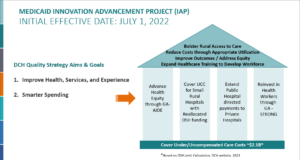Key Takeaways from HomeTown Health’s Webinar: Advancing Healthcare Access and Quality in Georgia Through Directed Payment Programs

Sellers Dorsey, in partnership with HomeTown Health, recently participated in a webinar to provide insights on directed payment programs (DPPs) in Georgia and how the state is utilizing this funding mechanism to support quality and workforce improvements. During the webinar, experts at Sellers Dorsey, including Managing Director, Tanya Boone, and Senior Consultant, Kevin Carvalho, provided an overview of DPPs and the partnerships designed to positively impact healthcare delivery in the state of Georgia. In case you missed the webinar, our experts at Sellers Dorsey have summarized the key takeaways for your reference.
Medicaid Finance and Directed Payment Programs in Georgia: Your Questions Answered
- What are Medicaid supplemental payments?
- Payments to providers that are separate from and in addition to the reimbursements (base payments) for services provided to Medicaid enrollees.
- Various Medicaid providers receive supplemental payments, such as hospitals, physicians, nursing facilities, ambulance providers, and mental health facilities, either in fee-for-service (FFS) or as directed payment programs (DPP) in Medicaid managed care.
- Why are Medicaid supplemental payments needed?
- Most Medicaid reimbursement rates are well below cost, leaving providers at a financial loss that may inhibit the impact of care.
- Through supplemental payments, states have the opportunity to direct the increased funds to advance quality and access in Medicaid services.
- What is the purpose of disproportional share hospital payments (DSH)?
- To offset hospitals’ uncompensated care costs for Medicaid and uninsured patients.
- What are Directed Payments?
- Directed Payments are Medicaid supplemental payments for Managed Care that conform to the 2016 CMS Medicaid Managed Care Rule
- Tied to Medicaid utilization for the period
- Require evaluation and quality metrics
- More flexibility to pay hospitals higher rates
- Must obtain annual CMS approval using CMS pre-print process
Overview of Recent Medicaid Financing in Georgia
The Medicaid innovation advancement project (IAP) was a comprehensive initiative by the state to support Georgia providers and to help reduce uncompensated care costs (UCC) across the state. The initial effective date for the IAP was July 1, 2022. The state’s approach was to focus on four goals:
- Bolster rural access to care
- Reduce costs through appropriate utilization
- Improve outcomes / address quality
- Expand healthcare training to develop workforce
The state worked towards these goals by establishing four pillars for innovation.

- Advance healthcare access through GA-AIDE
- Cover UCC for Small Rural Hospitals with reallocated DSH funding
- Extend Public Hospital DPPs to Private Hospitals
- Reinvest in healthcare workers through GA-STRONG
The Results
- CMS approval of directed payment programs
- $1.6B in additional total funds
- Reduces all GA hospitals’ UCC by more than 50%
With approval by CMS, these programs resulted in $1.6 billion in new funding to advance the state’s quality goals and objectives. Secondly, the programs attained coverage of Medicaid UCC for small rural hospitals through DSH. Thirdly, the IAP reduces all Georgia’s hospitals’ Medicaid UCC by more than 50%.
Curious to learn more? Click here to access the PowerPoint presentation.



